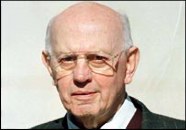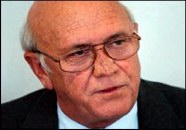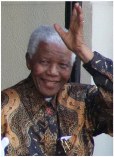The SA Government and ANC confrontation (Apartheid Era)



Images. From left to right: PW Botha, FW de Klerk and Nelson Mandela.
Why the ANC confronted the South African government
The Union of South Africa came into being on 31 May 1910. The parliamentary membership limited to whites only
sent out a clear signal that the Union was not prepared to accommodate blacks. Racial segregation and white
supremacy were to continue. "Left out in the cold" blacks founded The African National Congress (ANC) on
8 January 1912 in Bloemfontein to uphold the interests of blacks and defend their rights by peaceful means.
More controversial issues sending shockwaves into the black communities followed over the years:
Legislation passed in 1913 restricted black land ownership to 13 percent of South Africa's total area, Apartheid -
a policy of racial segregation was introduced after the 1948 election, seperate development came - blacks were
forcefully removed to other areas and so called homelands were created.
This never silenced the ANC - over the years they fought racism and oppression, organising mass resistance and
mobilising the international community.
Following protests in 1960 and the Sharpeville massacre, the banning of the ANC and PAC from political activity;
the ANC took up the armed struggle against the S.A government and apartheid.
The ANC's military wing Umkhonto we Sizwe (MK)"Spear of the Nation" was formed in 1961.
It's first leader was Nelson Mandela (Image) who concentrated on targeting and sabotaging government facilities.
During the 1970s and 1980s the ANC leadership in exile under Oliver Tambo targeted Apartheid
government leadership, command and control, secret police, and military-industrial complex
assets and personnel in decapitation strikes, targeted killings, and guerilla actions such as bomb explosions in facilities frequented by military and government personnel.
Terrorist attacks on innocent civilians
A number of civilians were killed in ANC attacks. Examples of these include the Amanzimtoti
bombing, the Sterland bomb in Pretoria, the Wimpy bomb in Pretoria, the Juicy Lucy bomb in
Pretoria and the Magoo's bar bombing in Durban.ANC acts of sabotage aimed at government institutions included the
bombing of the Johannesburg Magistrates Court, the attack on the Koeberg nuclear power station, the rocket attack
on Voortrekkerhoogte in Pretoria, and the 1983 Church Street bombing in Pretoria, which killed 16 and wounded 130.
Source: Wikipedia.org
Despite external aid in it's many forms (included financial aid contributions to this organisation by countries such as
Sweden, Norway, The Netherlands and Austria; training in ANC friendly countries and training offered by Cuba,
Czechoslovakia, East-Germany, Angola, Communist China, Egypt, Ethiopia, Zambia and Mozambique; equipment
(weapons, etc) from the USSR, East Germany and Czechoslovakia; internal and international protests gearing up
considerably - the ANC and Umkhonto we Sizwe (MK) struggled to achieve it's ultimate goal.
South Africa cripled the ANC, the MK and it's operations to a very large extent.
South Africa and the SADF had the infrastructure and strategies in place to deal with the ANC, MK and co,
it's structures, terrorist actions and movements
*Commando units, of course, had a major role to play in South Africa's rural, urban, and industrial areas. Their functions
included area defense, anti-terrorist actions and some other services.
*Cross border raids on ANC facilities were carried out by the Special Forces to disrupt it's command structures and
operations.
The South African military engaged in a number of raids and bombings on ANC bases in Botswana, Mozambique,
Lesotho and Swaziland.
From a military point of view the SADF's resources, discipline, structures, world class training
and equipment contributed to it's effectiveness to outmaster the enemy here in South Africa, Angola
and in some other ANC friendly African countries.
Whereas the ANC was weak in bureaucratic resources, military capacity, and economic leverage.
Real power will therefore remain in the hands of the "Apartheid government"
Military power, i believe, played a part in sending the S.A government to the negotiation table.
That made it possible for the S.A government to negotiate from a position of strength.
Weakness of the ANC and Umkhonto we Sizwe
*Thus, “on behalf of the ANC,” Terror Lekota reinterprets the goals of the “armed struggle” in terms quite contrary to the
mobilizing slogan of “Victory or Death”: “When the armed wing was set up it was not because the ANC was in search
of a military victory. No, Umkhonto was merely to pressure the government to respond to the demands of the people”
(Cape Times, May 3, 1990).
*Even the popular Chris Hani openly admitted that his MK troops were not in a position to destroy apartheid. When
asked whether MK could have won the war, Hani said, “MK alone without the Mass Democratic Movement would not
have caused problems.” Although he stressed the ANC’s capacity, ultimately “to destroy the will of the government to
continue with Apartheid,” he added realistically, “but it would have taken a very, very long time” (Monitor, December 1990).
*The ANC could become the sole government only if it were able to defeat its opponent, a capacity that, by its own
admission, it lacks. Pretoria is thus under little pressure to surrender, especially since the ANC no longer has the
intention to declare war.
*General Constand Viljoen: “The ANC, in the 80s, realised they were not in a position to win a military struggle.
*The initial organizational chaos within the ANC reflected badly on its potential for rule and deterred sympathizers and
adversaries alike from considering the organization an effective alternative to the present government.
“When the movement cannot even clean up the hopeless muddle in its own head office,” read an editorial in the
National Party organ, Die Burger (July 4, 1991).
Impact of sanctions
After 1987, although the ANC continued to demand comprehensive mandatory sanctions, the sanctions drive lost
momentum in Western public opinion. This perception was reinforced by the failure of existing measures to change
Pretoria’s policy as well as by the realization that South Africa was relatively self-sufficient and that the Frontline States
depended on the South African economy."
All in all, then, no general conclusion can be drawn about the success or failure of sanctions against South Africa.
Undoubted harm to the South African economy did not automatically translate into political reformism,
although disinvestment was one among several other factors contributing to the abolition of apartheid.
The Opening of the Apartheid Mind
Options for the New South Africa
Heribert Adam and Kogila Moodley
Who then had the means to force the Government of South Africa to the negotiating table?
*“We believe that you in the U.S., together with your allies, have the means to get the South African government to
the negotiating table,” read an “Open Letter to the American People,” signed by Allan Boesak, Desmond Tutu, Beyers
Naudé, and Frank Chikane on the occasion of their Washington visit to the newly elected President Bush
(ANC Newsbriefing, June 4, 1989).
Sources and links
African National Congress
http://en.wikipedia.org/wiki/African_National_Congress
Umkhonto we Sizwe
http://en.wikipedia.org/wiki/Umkhonto_we_Sizwe
Nelson Mandela
http://en.wikipedia.org/wiki/Nelson_Mandela
Louis Botha an Afrikaner and first Prime Minister of the Union of South Africa
http://en.wikipedia.org/wiki/Louis_Botha
African National Congress
http://www.anc.org.za/
Union Of South Africa
http://africanhistory.about.com/od/southafrica/a/UnionSA.htm
http://en.wikipedia.org/wiki/Union_of_South_Africa